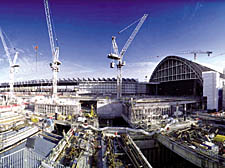|
|
 |
| |

The King’s Cross development |
We need a rethink over KX
How did the £2bn King’s Cross development get the green light with little or no debate? asks Michael Edwards
LAST week the King’s Cross Think Again campaign asked the High Court that Camden’s permissions for Argent’s development be quashed. The request is based on a very simple, straightforward, argument. But lying behind it are fundamental questions about what sort of London we want and how democracy should be working.
The challenge to Camden is simple. It is that elected councillors were wrongly persuaded by officers and by the council’s lawyers that they really had no choice but to confirm an earlier provisional decision when they met on November 16, 2006.
Many deputations to the meeting were very unhappy indeed about this, making it very clear that they wanted the whole development, or aspects of it and its associated agreements, to be reconsidered. Some councillors publicly expressed the same view. The legal advice we had obtained was the opposite of Camden’s, stressing that the council were under an obligation to reconsider a long list of problems with the scheme.
This all took place against the background of Camden’s over-zealous insulation of its committee members from anything which might influence them. On such a complex scheme councillors could have been informed by regular officer briefings on the negotiations with developers and exposed to debates between developers and residents. In fact they were protected from these influences and reached the point of decision-making without enough preparation. In March 2006 they had about 10 days to digest a 900-page report and then a meeting over just two evenings to decide everything.
No wonder some councillors feel they have been unable to do the proper job which democracy requires of them. And those who did interact with their constituents on the subject were warned that they could be reported to the Standards Board. The cost of housing and commercial space is extremely high and gentrification rampant in Camden. The challenge for a planning authority in such an area is how to secure the potential benefits of development while inoculating the area against displacement. The phrase ‘sustainable communities’ must surely mean just this.
So probably the major issue of concern to residents and councillors at King’s Cross is to secure as much housing, especially social housing to rent, as they possibly can.
A second set of issues are global warming and pollution where the goal posts are moving all the time and it seems utterly unwise to approve a flagship scheme in its entirety today, especially one which only just meets (or perhaps even fails to meet) today’s aspirations towards zero-energy and pollution re duction. And that in a locality where air quality is already worse than the EU permitted limit.
The other main sphere where many councillors and citizens seek improvements is the handling of the historic buildings between and behind the stations. Whatever gets built here will provide the permanent setting for two very fine stations, both listed as Grade I and needs to make the most of this unique configuration of railway, canal and industrial history, complete with workers’ housing.
The criticism of the current proposals is that so much of that inheritance would be swept away with just a few precious individual buildings preserved and dwarfed by the surrounding office slabs. English Heritage, the government’s guardian of the historic environment seems to have been a walkover for commercial pressures.
A big priority for Camden’s former leadership was clearly to concentrate on their side-agreement – Section 106 agreement – with the developers and they are proud of the results, though opinions differ on how good it really is.
There is a strong contrast here with the policy of Camden’s previous chief officer David Pike who tried to negotiate the best possible development, avoiding a poor scheme offset by the compensations of an agreement. It is a very important issue and it is yet another one which councillors have not yet been able to debate properly.
|
 |
|
 |
|